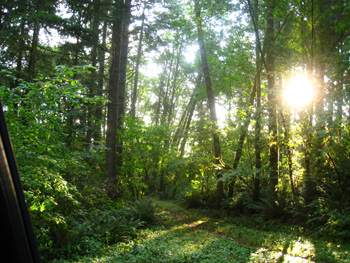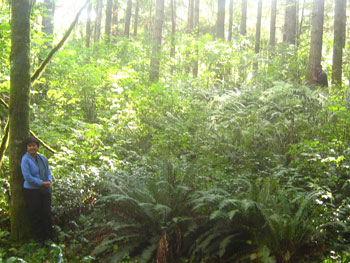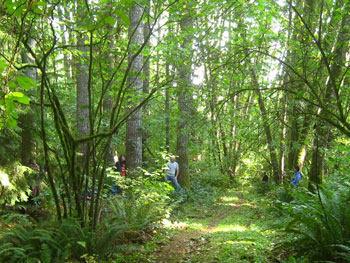
A shortcut through the forest between the Cloud Mountain driveway and Agren Road.
Photo by Jo Lynn McCully

Cloud Mountain Retreat Center finishes its land acquisition
Supporters have added 9 acres of natural forest land to Cloud Mountain Retreat Center, helping preserve the facility as an island of serenity and refuge for all seeking to deepen their dharma practice on retreat.
The 2011 acquisition, adding to Cloud Mountain’s original 5 acres, completes an 18-month fund-raising project by Friends of Cloud Mountain. Also called FOCM, this is the non-profit organization that supports the Southwest Washington retreat center.
For decades, retreat participants have come to value the beauty, quiet and solitude of this forest practice center, as a support for deepening their meditation practice. Cloud Mountain’s mission is to provide opportunities for people to hear and practice the teachings of the dharma in a silent, rural, retreat format.
“The deep forest environment of Cloud Mountain adds an element to my retreat practice—of ease, of peacefulness, of delight—that I deeply cherish,” said long-time Cloud Mountain retreatant Joe Pearl. “Simply arriving in that environment, I always feel that my retreat has begun.”
The spark for the purchase of these 9 acres of forestland occurred when the Friends of Cloud Mountain board was approached by a neighbor, who was considering clear-cut logging his property along Cloud Mountain’s long northeastern border.
But understanding the mission of the center and the impact the logging would have, the owner offered the board the option of purchasing the land. In this way the owner would get the revenue he needed, and Cloud Mountain would be able to preserve the forested character of its northeast border.
The board turned to Cloud Mountain’s hundreds of supporters to raise the needed $142,000, and the response was strong.

Kamala Masters resting on an alder tree.
Photo by Laura Hauer
More than 600 meditators and supporters from across the country, as well as from the Northwest, gave generously. The majority of donations ranged from $20-$250, with a limited number of larger donations.
One of the donors, a frequent retreatant named Sharon Brain, said she and her husband strongly believed it was important to rescue the forestland from clear-cutting.
“We supported the purchase of the forestland at the end of one retreat out of gratitude for being held in the deep seclusion of Cloud Mountain,” she said. “While we know that nothing is permanent, a change such as clear cutting would certainly impact the nature of that seclusion, and we are grateful it did not happen.”
The land acquisition supports several of the board’s aspirations for the retreat center.
First of these has been to prevent clear-cutting on the center’s borders. Over a decade ago the property on the center’s southern and western borders was clear-cut, leaving a devastated landscape, displaced wildlife, disturbed wetlands and a tragic disruption of the natural peace and beauty of the retreat environment.
Purchasing the adjacent property will prevent this from happening a second time.
The second aspiration has been to maintain a broad buffer zone around the perimeter of the retreat center, shielding against the inevitable growth and development that has been steadily eroding the rural atmosphere of southwest Washington.
“Solitude and being in the woods are some of the key attractions for me at Cloud Mountain,” said Claude Ginsberg, a frequent retreatant. “It would have been much more difficult to maintain the retreat atmosphere if the lower section was clear-cut and possibly sold for development.”
Now the board is planning how to best utilize the new forestland to further the retreat center’s mission of supporting dharma practice.

A group of retreatants exploring the forest prior to the final decision to purchase it.
Photo by Laura Hauer
To start, a network of trails through the majestic old fir trees has been constructed by retreat center staff and volunteers. These trails invite retreatants to walking meditation in the deep silence of the woods, or to stroll the paths during meal breaks.
“The new trails allow me to spend time slowly walking through the forest, listening to the birds and not really seeing much of anything human-made,” Ginsberg said.
Efforts also are underway to maintain the forestland as habitat for the myriad wildlife that dwells there. Dozens of birdhouses designed and constructed to house specific bird species were donated by a member of the sangha, and hung throughout.
Later development of the forestland will likely include building six to 10 small, simple, sleeping and meditation huts, traditionally called “kutis”.
The kutis will expand Cloud Mountain’s ability to house as many people as possible in single rooms while on retreat. Designed to be rustic but comfortable, they will be situated around the periphery of the forestland to maintain the feel of undisturbed natural forest.
Construction of at least two of them will likely begin within one to two years.
Funds have been pledged to cover the cost of materials for two kutis, with volunteer construction expertise provided by Dhammadasa (David) Branscomb, who built Cloud Mountain’s existing buildings.
Another possible project is to build a covered walking meditation structure on the new land, directly adjacent to the Cloud Mountain’s lower parking area. This would be an open-sided but roofed structure that would provide retreatants with a dry, illuminated area for walking meditation during the wet, dark winter months.
Seeing the new forestland’s positive impact on the retreat environment, the board hopes over time to acquire more of land surrounding Cloud Mountain. The board in particular hopes to acquire 33 acres of state-owned land on Cloud Mountain’s western boundary. This would expand the retreat center’s physical boundaries, and enhance its possibilities as a dharma center.
Cloud Mountain was founded in 1984 as a non-sectarian Buddhist center in Castle Rock, Wash., with the goal of providing groups and individuals with an environment conducive to meditation. Since then it has continuously hosted retreats for the Northwest community of meditators.
“I am very aware that Cloud Mountain is a rare and precious resource for us in the Northwest. It is such a privilege to be able to get in the car and to be at Cloud Mountain in a couple of hours,” Ginsberg said. “Many practitioners don’t have a retreat center near them, and have to spend extra money, time and carbon to get to one.”
About the author:
Laura Hauer is a co-founder of FOCM, and sits on its board as treasurer. She worked for 11 years as the Cloud Mountain business director.